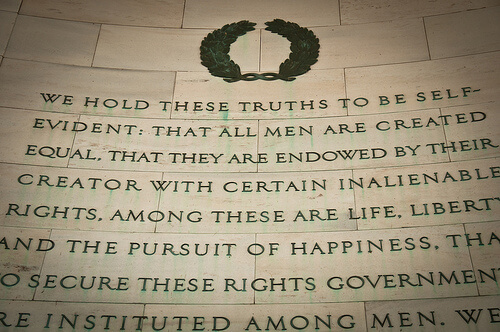
Psalm 144:15
It is perhaps one of the most misunderstood phrases in American life – “the pursuit of happiness”. We find the cherished phrase in the second sentence of the Declaration of Independence, where among “certain unalienable rights” are “Life, Liberty, and the pursuit of happiness”. It is a misunderstanding of the phrase that explains many of the problems our nation faces today.
The author of the Declaration of Independence, Thomas Jefferson, left us with little excuse for misunderstanding his meaning. Jefferson followed in a long line of ethical writers who equated the pursuit of happiness with the pursuit of a virtuous life. For Jefferson happiness had more to do being good rather than feeling good. In a letter to a neighbor and former secretary William Short, Jefferson said that he considered “Virtue the foundation of happiness”. Jefferson, like others of the Founders, believed that the practice of virtue was essential to his nation’s true happiness.
Jefferson actually borrowed the phrase “the pursuit of happiness” from the English philosopher John Locke (1632-1704). Writing in An Essay Concerning Human Understanding, Locke distinguished between “real” and “imaginary” happiness, between “true pleasures” and “false pleasures”. He encouraged only “the pursuit of true and solid happiness”. He warned that happiness does not come from property, pleasure, or satisfaction of desire, but only from the practice of virtue. By Locke’s analysis a bank robber celebrating his success with his friends at the pub is happy, but not really. His is but an “imaginary” happiness without any “true pleasure”.
Just as Jefferson drew upon the work of John Locke, so Locke drew upon Greek and Roman philosophers to sort through issues of happiness and virtue. Locke especially looked to the Greek philosopher Aristotle (384-322 B. C.), who devoted more space to the subject of happiness than any thinker before the modern era. Aristotle taught that virtue is the only foundation for happiness. Writing in his Nicomachean Ethics, he said that happiness is the “activity of the soul expressing itself”.
Locke also acknowledged his debt to the Roman philosopher and statesman Cicero (106-43 B. C.), who in his treatise On Moral Ends (Book II) said that we should eliminate pleasure from any discussion of happiness. Happiness, Cicero said, has to do with the practice of virtue. “Indeed,” Cicero asserts, “no good should be declared supreme if it is lacking virtue, since nothing can be superior to that”. Cicero even suggested that a virtuous person might be happy even while being tortured.
Many years ago I was visiting a young friend in a psychiatric hospital where he was being treated for drug addiction. While at the hospital I had opportunity to talk to my friend’s psychiatrist about addiction. The psychiatrist told me that he had emigrated from German to American and learned about the phrase “the pursuit of happiness”. He said he knew that as a newcomer to America, he would never lack for people with problems to treat. He explained that “people who are in pursuit of happiness are very unhappy people”.
Isn’t this the grand paradox of happiness – the more we pursue happiness the more elusive it is! I am a Baby Boomer raised on the ethos of “trying to find ourselves” and “if it feels good do it!” I have lived long enough to see my generation get just about everything we wanted, and still we are not truly happy. We have pursued pleasure, wealth, success, fame, yes, even happiness, and come up empty each time.
Today we face critical, serious choices as a nation, but still many are asking what will make us happy, what will make us feel good. We ought only to be asking what is right; what is the virtuous thing to do with the choices before us?
It is only answering the question of ‘what is virtuous?’ that will lead us out of the swamp we are in. Yet again, the ancient psalmist shines light on the pathway ahead: “Happy are the people whose God is the LORD”. Here is happiness ‘true’ and ‘solid’.
Grace and peace,
Tim
photo by reed_sandridge



